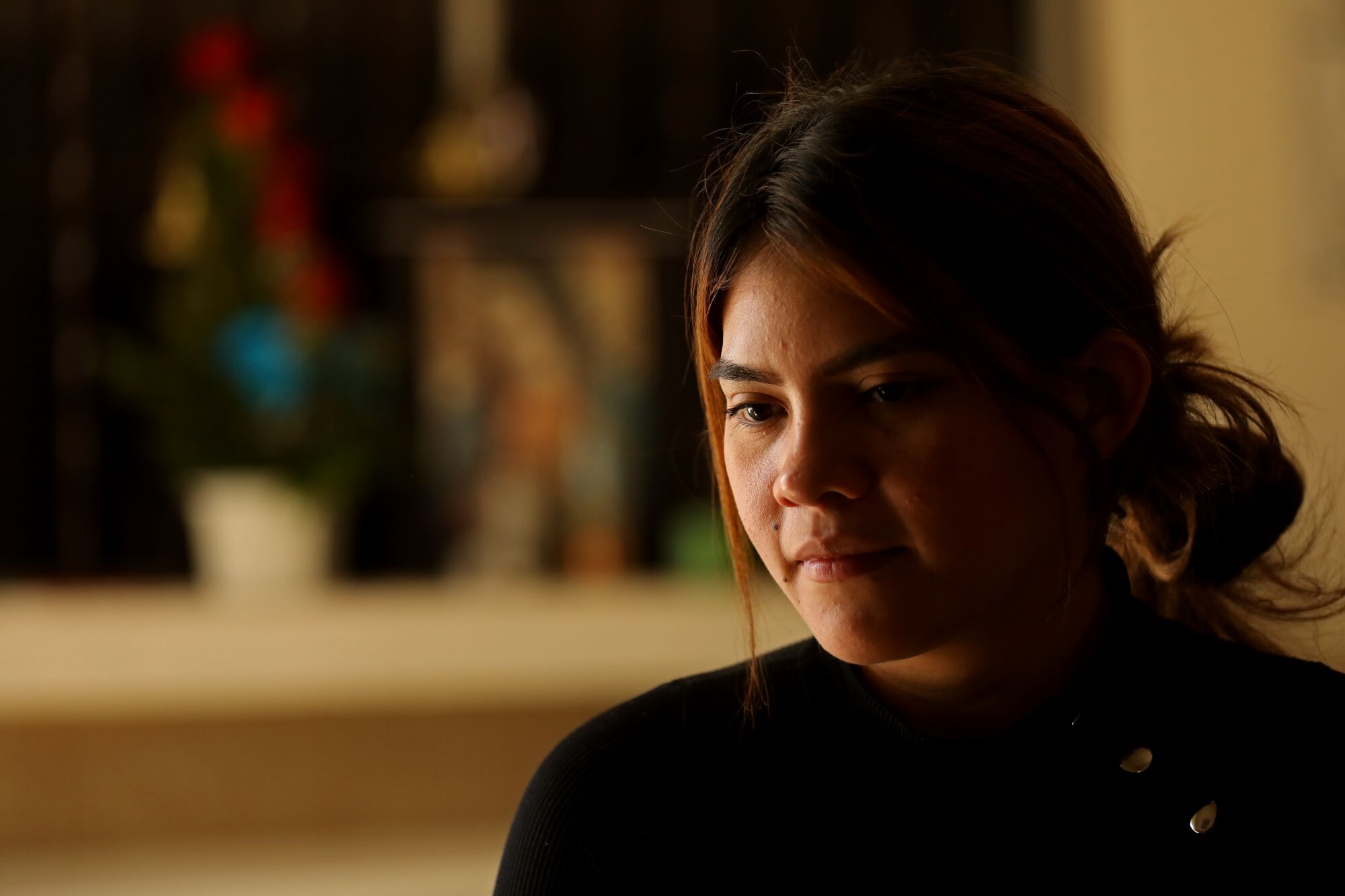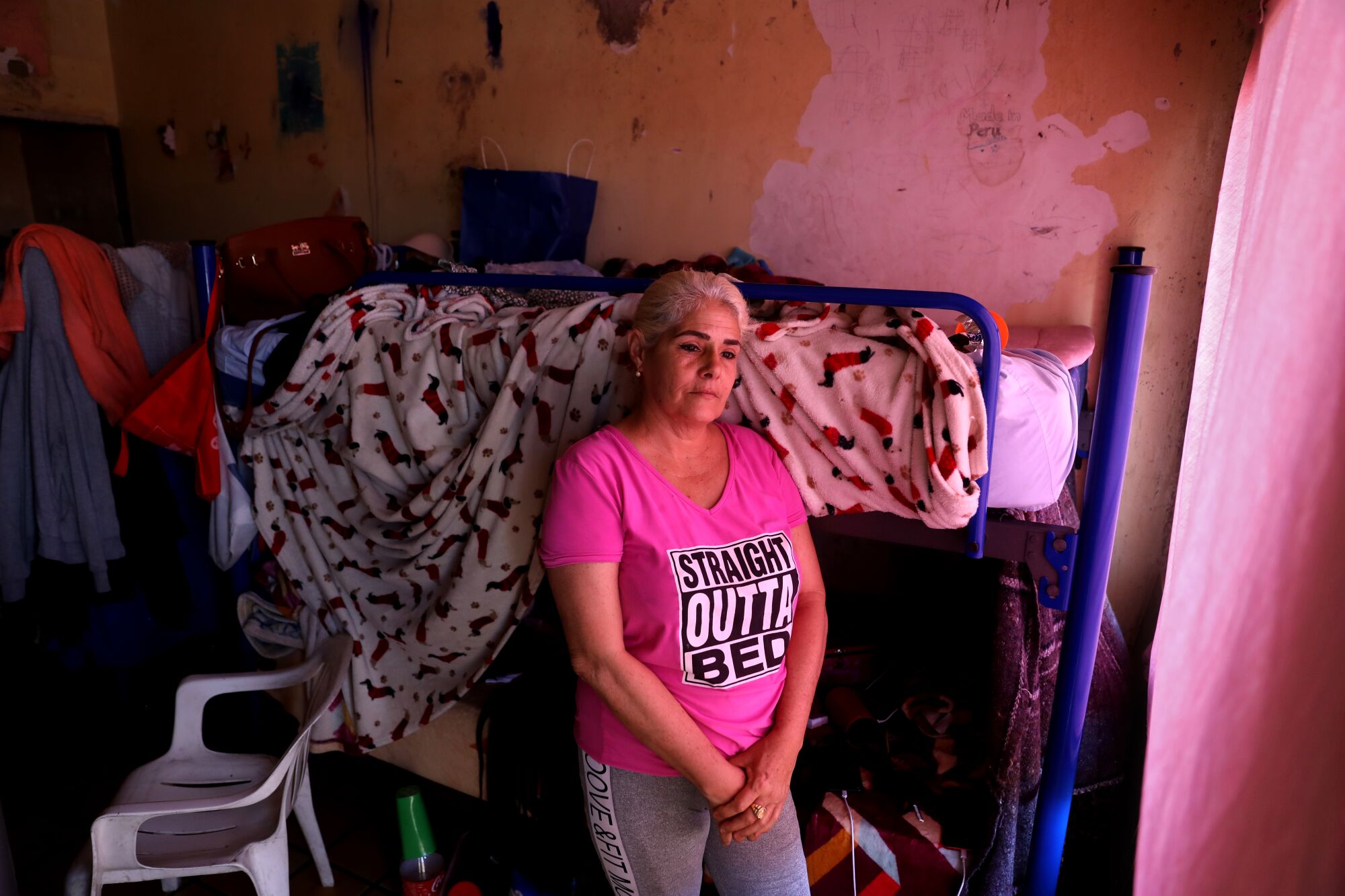Title 42 finish forces migrants to battle confusion at border
[ad_1]
After 5½ months residing in a shelter throughout the border from Yuma, Ariz., Soraya Amaya began feeling determined.
The 22-year-old from El Salvador had utilized every day for asylum appointments for her household of 5 utilizing CBP One, the U.S. Customs and Border Safety cellular app that launched in January and that migrants should now use to hunt humanitarian safety.
Every day she had been met with a denial — since its launch, the applying has been stricken by technical glitches and a shortage of appointments which have shut out many migrants.
However lastly, on Thursday, her husband’s stepfather known as with excellent news.
“We’re leaving,” he informed her. “We obtained it.”
Amaya’s expertise stays the exception to the rule. Simply 1,000 appointments are granted every day by way of the app, however migrants say they’ve not too long ago observed fewer glitches and extra appointments being granted to those that have been ready the longest, a part of an replace the Homeland Safety Division had promised. The app was supposed to scale back the variety of crossings between ports of entry.
The expiration of Title 42, a coverage carried out amid the COVID-19 pandemic that prevented many asylum seekers from getting into the U.S., has offered a dilemma for tens of hundreds of U.S.-bound migrants stranded in Mexico. Whereas there was typically no consequence for being expelled a number of occasions underneath Title 42, being deported now can have life-altering ramifications, together with being banned for years from reentering the USA.
Earlier than the CBP One app’s launch, Amaya and her household tried to enter the U.S. as soon as, presenting themselves to frame brokers — who detained them for just a few days after which returned them to Mexico.
However Title 42 was nonetheless in impact then, blocking migrants from requesting asylum. Through the expertise, she mentioned, a Border Patrol agent threw her household’s paperwork to the bottom and stomped on them.

Soraya Amaya tried for months get her household one of many 1,000 U.S. asylum appointments out there every day by way of the CBP One cellular utility. As they waited, she volunteered to assist others at their migrant shelter in San Luis Rio Colorado, Mexico.
(Gary Coronado / Los Angeles Instances)
When she and her household have been launched, a Mexican humanitarian group drove them to Casa del Migrante, a shelter in San Luis Rio Colorado, Mexico, that distributes 200 meals every day.
Most migrants are capable of keep there a most of three days. Amaya’s household labored out a deal during which she managed among the shelter’s day-to-day actions in change for a vast keep.
She turned the best hand of the director, Martin Salgado Ames. Her husband, in the meantime, discovered work on an area ranch. They have been housed and fed, however their lives have been nonetheless in limbo.
Again in El Salvador, Amaya and her husband had a thriving enterprise promoting curtido, a preferred cabbage slaw.
“I can’t afford to make a mistake.”
— Juan Manuel Torres León, 40-year-old chef from Venezuela
Then got here the gang threats.
First it was extortion: They have been compelled to pay $35 a month, then $60 and $100. Unable to afford the funds and their payments, Amaya and her husband determined to inform the police. The hassle was futile: After extortion got here demise threats, she mentioned.
They fled final yr with their younger son and her husband’s dad and mom, and $105 of their pockets. In Chiapas, Mexico, they have been helped by a church. They obtained humanitarian visas in Mexico and utilized for asylum there.
Feeling safer, Amaya and her 4-year-old son have been on their strategy to a playground someday when two males in a white truck tried to kidnap them, she mentioned. Native residents helped them escape, however the incident left her questioning whether or not the gang had caught as much as her. In any case, they’d seen its graffiti throughout city.
As soon as extra, they fled.
At Casa del Migrante, Amaya frolicked over the months she was there serving to different migrants register for appointments. A number of folks obtained fortunate, principally single adults or single moms with one little one.
She began considering, “Why, God, why are we nonetheless right here?”
Amaya and her household are scheduled for appointments within the U.S. later this month. The wait, she mentioned, was value it. But it surely’s bittersweet: Now it’s the opposite ladies on the shelter, all of them Mexican or Central American, who’re questioning after they’ll get their flip.
The top of Title 42 reopened the likelihood for migrants from El Salvador, Guatemala, Honduras and Mexico, who made up many of the expulsions underneath the rule, to once more apply for asylum within the U.S. However for somebody from a type of international locations, it’s usually troublesome to truly obtain it. Immigration judges can argue, for instance, that gang violence doesn’t meet the usual for humanitarian safety.
On the shelter, adorned sparingly however for a shrine to the Virgin Mary, an indication in English provides phrases of hope: “With God, all issues are doable.”
In the meantime, in Ciudad Juarez, Mexico, Juan Manuel Torres León, a 40-year-old chef from Venezuela, additionally confronted uncertainty about his odds of getting an appointment by way of the cellular app. The scenario after Title 42 is “way more sophisticated,” he mentioned.
“I can’t afford to make a mistake,” he added.
He and his spouse have been detained on the border in El Paso final week, he mentioned. His spouse was launched, given a discover to seem in immigration courtroom, and deliberate to fly from El Paso to Miami to reunite with kinfolk. However Torres says that after 4 days in Border Patrol custody, he was despatched again to Juarez on Thursday night time, the previous couple of hours that Title 42 was in impact.
The couple left their two daughters, ages 7 and 5, again in Venezuela.
“The journey was too harmful for them,” Torres mentioned, talking exterior a church shelter.
He recalled the grueling trek by way of the Darien Hole jungle from Colombia into Panama — report numbers of migrants have been climbing by way of the treacherous strip — and the troublesome slog from Central America to the U.S.-Mexico border.
Now Torres is caught in Juarez, considering his subsequent step. He and different Venezuelans right here have paid 50 pesos an evening, about $2.50, to sleep on the ground of an deserted constructing.
He hopes to attain an interview with U.S. immigration authorities by way of the CBP One app, however as has been the case for therefore many others, the method has been irritating. He mentioned he had been making an attempt for greater than two months to get an appointment.
“The entire thing feels improvised, completely random,” he mentioned. “A query of luck.”
Like many Venezuelans, he has no present passport — the doc is dear and troublesome to acquire in that nation — complicating efforts to use for non permanent lawful entry, which is out there for some Venezuelans who’ve U.S. sponsors.
“If I attempt to cross and get detained once more, I’m afraid I’ll by no means be capable of be reunited with my spouse,” Torres mentioned. “I’ve to be very cautious about my subsequent step, now that Title 42 is over. Every little thing will depend on making the proper resolution now.”

Yusimy Vazquez regrets leaving Cuba along with her grandson as U.S. immigration coverage adjustments. As Cubans, they’re supposed to use for humanitarian parole earlier than touring to the U.S. However since they’re now at a shelter a mile from California, she hopes to attain an appointment by way of the CBP One app.
(Gary Coronado / Los Angeles Instances)
At Cobina Posada del Migrante in Mexicali, Yusimy Vazquez, 53, lamented the adjustments to U.S. immigration coverage. Had she identified how troublesome it could change into to request asylum, she mentioned, she wouldn’t have risked leaving Cuba final Christmas Eve along with her 6-year-old grandson.
Cubans, like Venezuelans, Nicaraguans and Haitians, can apply for humanitarian parole as long as they don’t try the journey by land or sea with out authorization. U.S. Homeland Safety officers will now inform some asylum seekers from these international locations who’ve been arrested by Border Patrol that they will voluntarily return to Mexico with a purpose to apply for the parole program from their dwelling nation.
For Vazquez, it’s too late — she’s already a mile from the California border. All she will be able to do is hope she will get an appointment by way of the CBP One app to plead her case.
Vazquez mentioned she obtained demise threats after her daughter participated in 2021 protests in opposition to the federal government in Cuba. Her daughter fled to Mexico first, then crossed the Rio Grande and turned herself over to U.S. border brokers. She now lives in Florida, and, on account of immigration courtroom backlogs, will plead her case for asylum in 2028.
Vazquez and her grandson have had a special expertise. In Chiapas, a person kidnapped them, locking them in his dad and mom’ dwelling for almost two weeks in an extortion try, she mentioned. The kidnapper’s father finally took pity on them and allow them to go, she mentioned. However now her grandson suffers panic assaults.
The advocacy group Human Rights First has documented greater than 13,400 violent assaults on asylum seekers caught in Mexico throughout President Biden’s first two years in workplace.
Like different migrants, Vazquez selected to journey to Mexicali after studying by way of social media that the realm had extra humanitarian help and fewer folks looking for U.S. entry than different border cities.
When she arrived late at night time on April 19, two shelters turned her away earlier than Cobina Posada del Migrante let her in. The shelter can also be over capability — it has house for 180, however 300 are staying there, mentioned director Elizabeth Gallardo. On Saturday, Gallardo mentioned 20 households — 60 folks whole — had landed CBP One appointments within the earlier two days.
For Vazquez, that’s sufficient to remain hopeful.
“I place confidence in God, primarily,” she mentioned. “If in the present day was your flip, congratulations. Tomorrow can be mine.”
Castillo reported from San Luis Rio Colorado and McDonnell from Ciudad Juarez.

